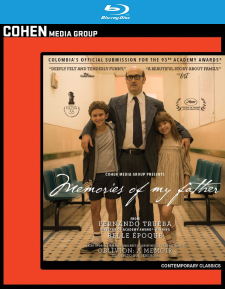Memories of My Father (Blu-ray Review)

Director
Fernando TruebaRelease Date(s)
2020 (January 3, 2023)Studio(s)
Caracol Television/Dago Garcia/Lupin Film (Cohen Media Group/Kino Lorber)- Film/Program Grade: B+
- Video Grade: A
- Audio Grade: A-
- Extras Grade: B+
Review
A while back I reviewed a biographical drama from Italy called One Hundred Steps (I cento passi, 2000), about a political martyr famous there but virtually unknown outside Italy. The film had a TV-movie type screenplay, competent but unexceptional, though the story of its real-life main character, whom I had never heard of before, was interesting enough to, overall, made the picture moderately interesting. Memories of My Father (El olvido que seremos, 2020), first marketed as Forgotten We’ll Be, has all of these same qualities and deficiencies, uncannily so at times, with this time being a biographical film of Colombian doctor and activist Héctor Abad Gómez (1921-1987). Indeed, one scene near the end of Memories of My Father plays out as a virtual twin of a scene in One Hundred Steps.
One Hundred Steps follows its activist from childhood to early adulthood (mid-’60s-late ‘70s), while in Memories of My Father, the activist is experienced through the eyes of his son from his childhood through early adulthood (early-‘70s-mid-‘80s). The 1970s scenes, featuring Nicolás Reyes Cano as the son, Héctor, are in color, while 1980s scenes bookending the film, with Juan Pablo Urrego as a 20-something Héctor, are in black-and-white, a reflection, perhaps, of the darkest days of the decades-long Colombia conflict.
The other significant difference between the two films as that the activist in One Hundred Steps is basically a loner while the activist here, Dr. Héctor Abad Gómez (Spanish actor Javier Cámara, prominent in several Pedro Almodóvar films), is a devoted, doting family man. In 1970s Medellin, Abad is a university professor and human rights activist working on behalf of Colombia’s poor, pushing for vaccination programs and fighting poverty-driven diseases. He himself is upper-class, with his wife, son, and many daughters enjoying great comfort, and Héctor overly indulged by his possibly too-permissive atheist father. (The wife and daughters, however, are devout Catholics.)
Abad regards himself as a simple doctor and basically apolitical, but his frank and outspoken nature eventually lands his name on an assassin’s hit list and for much of the story he’s branded a Marxist. Early scenes feature filmmaker Whit Stillman (director of Barcelona and The Last Days of Disco) as an American colleague of Abad’s, apparently a member of the Alliance for Progress, a program initiated by President Kennedy. Conversely and disappointingly, the film strenuously avoids any mention of the U.S. government’s ruinous support of the Colombia military’s attacks on leftists such as Abad.
The screenplay by David Trueba, kid brother of director Fernando Trueba, and based on Héctor’s same-named memoirs, tells Abad’s story competently but unimaginatively. The first problem is that film depicts Abad as a virtual saint, a man so almost literally flawless and single-minded the script can do little but follow him around, as young Héctor does, and witness his untiring, determined selflessness, which from a dramatic point of view isn’t all that interesting. One can’t help but be reminded of Akira Kurosawa’s early masterpiece Drunken Angel (1948), in which Takashi Shimura played a similarly forceful doctor fighting poverty-fueled illnesses like a soldier in battle. That character works much better because he’s so flawed, an alcoholic whose sanctimoniousness and lack of diplomacy he uses as a shield to hide his own failings as a human being. Dramatically, the problem with Memories of My Father is that Abad has no failings.
Too much of the film consists of Abad speaking platitudes with Héctor sucking it all in like a sponge. A couple of scenes effectively contrast the relative luxury enjoyed by Abad’s family with the terrible poverty all around them, and the deepening everyday violence that will eventually seep into their lives in the worst possible way, but there’s not of enough of that stuff. The audience never really gets any sense of what drives Abad—Guilt over his own comfort?—or what kind of person Héctor is slowly evolving into. In a later scene he directly causes a near-fatal traffic accident, hitting an elderly pedestrian with his car, and there’s a vague implication that Abad uses his influence to get his son off lightly, but the script never follows through on this intriguing subplot.
Director Trueba keeps things moving, sometimes meticulously recreating moments from Abad’s life and death with great accuracy, yet I think a documentary about his life would be much more interesting and compelling than these dramatic recreations. Abad was truly at the forefront of providing medical care to poor: his Wikipedia entry in Spanish is quite extensive, but the English page about Abad is less than 150 words long.
Cohen Media Group’s Blu-ray, released through Kino, is Region “A” encoded. Shot digitally for a 2.35:1 ‘scope presentation in 4K by cinematographer Sergio Iván Castaño, the images are handsome in both color and black-and-white, almost a little too slick and attractive for a country suffering so much political violence. The Spanish DTS-HD Master Audio (offered in 5.1 and 2.0 stereo) is quite good, up to contemporary Hollywood standards though not showy, with excellent English subtitles.
There are a fair number of supplements, beginning with a 31:51 Zoom interview by film historian Annette Insdorf with director Tuba and actor Camara, conducted in English. The image and audio quality, presumably prompted by COVID issues, isn’t great but the conversation is worthwhile. Also worthwhile are five short making-of featurettes, each just under 4:30: The Actors, The Directors, The Filming, The Book, and The Production are self-explanatory. A trailer (2:19) is also included. More biographical information on Abad would have been helpful.
As with One Hundred Steps, Memories of My Father is not great cinema, particularly, but fairly engrossing nonetheless, and mildly recommended.
- Stuart Galbraith IV

